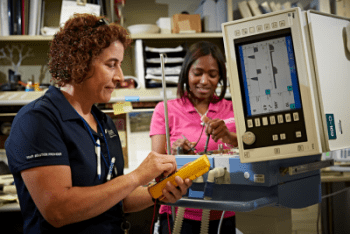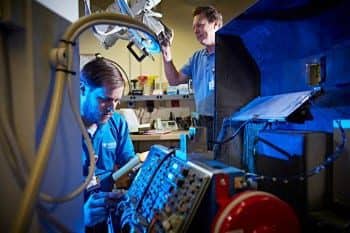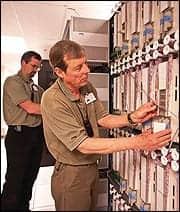Cultivating a Culture of Collaboration
For the third consecutive year, the College of Healthcare Information Management Executives has named Wilmington, Del.-based Christiana Care Health System a “Most Wired” facility—an honor, hospital officials say, that recognizes Christiana Care for its adoption, implementation, and use of health information technology. Below, Blake Collins, Christiana Care Health System’s director of clinical engineering, discusses what this award means from an HTM perspective and how the department collaborates with IT to improve patient outcomes.

Angela Grecco, senior BMET (left), and Monae Miller senior BMET (right), check for correct operating voltages on a patient ventilator.
24×7 Magazine: Can you please tell us a little bit about your department and the equipment you maintain?
Blake Collins: Christiana Care Health System’s clinical engineering team is comprised of 33 members, [making it] one of the largest clinical engineering teams in the nation. Our clinical engineers are tasked with managing all the medical devices used at Christiana Care’s two hospitals—Christiana Hospital in Newark, Del.; and Wilmington Hospital—as well as the freestanding Middletown Emergency Department.
We work for a health system that is a major teaching hospital, along with being Delaware’s largest private employer with more than 11,000 employees. As one of the busiest health systems, we rank among the top 25 health systems nationwide in terms of admissions and emergency department visits, as well as in the top 40 in terms of general admissions.
Our clinical engineering team works on a vast array of equipment that ranges from anesthesia carts and steam and peroxide sterilizers to infusion pumps and sequential compression pumps. We also work on more sophisticated equipment such as CT machines, MRIs, cath labs, and linear accelerators.
24×7: Congrats on Christiana Care’s “Most Wired” designation! Given the increased connectivity of medical devices, how does the clinical engineering team collaborate with IT department members?
Collins: When devices are requested for network connectivity, our clinical engineering department works with our information technology (IT) department to obtain an IP address that is relevant to the device model and location. This includes tracking software packages, MAC addresses, and anti-malware programs.

Evan Walburn, Imaging Service Tech I (left), and Ed Ksiazek, Imaging Service Tech II (right), perform functional checks of an AMX4+ mobile x-ray unit.
[Moreover,] our clinical engineering department has a close and working relationship with IT application analysts. This strong collaboration has led to our ability to do additional security scans and vulnerability checks before devices go live—and that allows us to close certain ports and establish the best cyber-posture for each device as part of its initial configuration. There is also a specific job role that is staffed as a dedicated information security resource to increase communication and bridge any gaps among staff who work in information security, IT, and clinical engineering—particularly when new devices are introduced into the infrastructure.
24×7:You mentioned cybersecurity. Can you please discuss in greater detail how Christiana Care’s clinical engineering department is working to thwart cyberattacks?
Collins: We take a risk management approach to cyber-threats through the implementation of controls found in security frameworks such as NIST Cybersecurity Framework and HITRUST Common Security Framework. In addition to vulnerability scans, hardening of services/applications, and passive network captures of medical devices, risk assessments include a hands-on approach to identifying and mitigating physical vulnerabilities, such as hardware ports and radio communication. Continuing education is also encouraged, and there is a high level of focus on security awareness. Finally, our clinical engineers learn official CompTIA Security+ coursework, which includes practical applications to clinical environments.
24×7: How has Christiana Care’s clinical engineering department evolved recently and how do you expect it to evolve even more in the future?
Collins: In the last year, our clinical engineering department has expanded the services we provide to include Christiana Care’s laboratory equipment. We also make efforts to understand current trends and adapt to industry changes to ensure that the equipment we maintain is safe and will provide value to both our clinicians and patients.
24×7: Can you please discuss a time when the clinical engineering department saved the day for another hospital department?
Collins:The extraordinary members of our team have “saved the day” for our colleagues in other departments [on numerous occasions]. One recent example occurred earlier this year, when Christiana Care’s Heart and Vascular Interventional Service flooded after an eyewash station failed. Water went everywhere, and one of the impacted rooms was an interventional lab most often used for the treatment of stroke patients.
To serve this vulnerable patient population, our clinical engineering department partnered with our facilities department to remove all the moisture. We opened up the equipment, as well as the anesthesia and interventional x-ray units, and ran cables through troughs. By working through the weekend and late each night, the room was restored in three days, rather than the expected seven days. With the restoration of our ability to perform those certain procedures, we prevented three patients from needing to be transported to another facility. [In addition to “saving the day”], this situation also demonstrates how our clinical engineering team uses resources wisely and efficiently.
24×7: What else should 24×7 Magazine readers know about your clinical engineering department?
Collins: Our clinical engineering department is fortunate to have a very diverse team—so diverse, in fact, that we mirror our patient population. Both the primary and secondary aspects of diversity are represented and put on display, allowing people to bring their complete authentic self to work, and we can leverage their unique viewpoints and life histories in our workplace.
The beautiful thing about our organization’s commitment to diversity is that by embracing diversity and respecting everyone, we achieve higher levels of engagement. In addition, creative ideas are considered—[thus enabling] higher-quality repairs to be performed more efficiently, which brings value to our patients. This makes Christiana Care a truly great place to work.
Want to view an on-demand webinar presented by Blake Collins? Click here.




